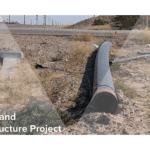
Environmental compliance auditing plays a crucial role in ensuring that companies like Midland adhere to environmental regulations and standards. By conducting comprehensive audits, Midland can identify areas of non-compliance, implement corrective measures, and minimize their environmental impact. This article explores the importance of environmental compliance auditing, the role of auditors in the process, Midland’s approach to auditing, the challenges faced, and the impact it has on the company.
Understanding Environmental Compliance Auditing
Environmental compliance auditing involves a systematic evaluation of an organization’s activities, operations, and practices to assess their compliance with environmental laws, regulations, permits, and internal policies. It is a proactive approach to ensure that companies like Midland are operating in an environmentally responsible manner.
Definition and Importance of Environmental Compliance Auditing
Environmental compliance auditing is the process of reviewing and assessing an organization’s compliance with applicable environmental laws and regulations. It is essential as it helps companies like Midland to identify potential risks, improve their environmental performance, and maintain a positive reputation.
By conducting regular environmental compliance audits, Midland can stay ahead of potential compliance issues and ensure that their operations align with the ever-evolving environmental regulations. This proactive approach not only minimizes the risk of legal penalties but also helps in preventing environmental incidents that could harm the surrounding ecosystems.
Furthermore, environmental compliance auditing also demonstrates Midland’s commitment to sustainability and shows stakeholders, including regulators, customers, and the local community, that they take their environmental responsibilities seriously. This commitment can enhance Midland’s reputation as an environmentally conscious company, attracting environmentally conscious customers and investors.
Key Components of Environmental Compliance Auditing
An effective environmental compliance audit comprises several key components. The first step is to establish clear objectives and scope for the audit. This includes determining the specific regulations and requirements relevant to Midland’s operations and identifying the areas to be assessed.
Once the objectives and scope are defined, the audit team conducts a comprehensive review of Midland’s procedures, practices, and records to assess compliance. This involves examining documents, interviewing staff, and conducting site inspections. The audit team pays close attention to potential environmental risks, such as air and water pollution, hazardous waste management, and energy consumption.
During the audit process, the team may also evaluate Midland’s environmental management systems, including their policies, procedures, and training programs. This holistic approach ensures that all aspects of Midland’s operations are in line with environmental regulations and best practices.
The findings of the audit are documented in a report, which includes a summary of the audit process, non-compliance issues identified, and recommendations for corrective action. The report serves as a tool for management to implement necessary changes and improvements. It provides a roadmap for Midland to enhance their environmental performance and maintain compliance with regulations.
Additionally, the audit report can be shared with relevant stakeholders, such as regulators and customers, to demonstrate Midland’s commitment to environmental responsibility and transparency. This open communication fosters trust and strengthens relationships with these key stakeholders.
Overall, environmental compliance auditing is a crucial process for companies like Midland to ensure that they operate in a manner that is both environmentally responsible and compliant with regulations. By conducting thorough audits and implementing necessary changes, Midland can continue to improve their environmental performance and contribute to a sustainable future.
The Role of Auditors in Environmental Compliance
Environmental compliance auditors play a vital role in ensuring that companies like Midland meet their environmental obligations. They possess a unique skill set and qualifications that enable them to evaluate an organization’s environmental performance objectively.
Qualifications and Skills of an Environmental Compliance Auditor
An environmental compliance auditor must have a deep understanding of environmental regulations and laws. They should possess knowledge in areas such as air quality, waste management, water pollution prevention, and hazardous materials handling.
In addition to technical expertise, auditors must also have excellent analytical and communication skills. These enable them to assess complex environmental issues, communicate findings effectively, and suggest practical solutions for non-compliance.
Responsibilities and Duties of an Environmental Compliance Auditor
An environmental compliance auditor is responsible for planning and conducting audits, analyzing data, identifying areas of non-compliance, and providing recommendations for improvement. They must maintain objectivity and integrity throughout the audit process.
Furthermore, auditors should maintain up-to-date knowledge of changing regulations and industry best practices. This ensures that Midland remains compliant and operates in a manner that minimizes its environmental footprint.
Midland’s Approach to Environmental Compliance Auditing
Midland is committed to environmental compliance and recognizes the importance of regular audits to assess its performance. The company follows a structured approach to auditing, which includes defining clear goals, ensuring auditors are qualified and experienced, and maintaining transparent communication throughout the process.
Midland’s Environmental Policy and Standards
Midland operates under a robust environmental policy that outlines the company’s commitment to sustainable practices. This policy serves as a guiding document for auditors and provides a framework for assessing compliance with internal standards and external regulations.
Midland’s Auditing Process and Procedures
Midland’s auditing process consists of several stages. It begins with the planning phase, where auditors establish objectives, determine the scope, and assemble the necessary resources. Next, auditors perform on-site inspections, review documents, and interview personnel to gather information for evaluation.
Throughout the auditing process, Midland encourages auditors to engage with employees at all levels to understand their perspectives and obtain valuable insights. Effective communication ensures that issues are identified and addressed promptly.
Challenges in Environmental Compliance Auditing
Conducting environmental compliance audits can present various challenges for companies like Midland, including complexity, resource constraints, and regulatory changes. It is essential to anticipate and address these challenges to ensure the effectiveness of the audit process.
Common Obstacles in Conducting Audits
One of the common challenges in environmental compliance auditing is the complexity and volume of applicable regulations. Ensuring compliance with numerous environmental laws and regulations can be time-consuming and resource-intensive.
Additionally, limited availability of trained auditors can pose a challenge. Finding qualified auditors who possess the necessary expertise and experience can be difficult, particularly in specialized areas of environmental compliance auditing.
Strategies to Overcome Auditing Challenges
To overcome these challenges, Midland employs several strategies. They invest in continuous training and development programs to ensure auditors are up-to-date with current regulations. Midland also utilizes advanced auditing tools and technologies to streamline the process and maximize efficiency.
Furthermore, Midland leverages partnerships with external consultants and experts when necessary. This allows for the integration of specialized knowledge and enhances the quality and thoroughness of the audits conducted.
The Impact of Environmental Compliance Auditing on Midland
Environmental compliance auditing has a significant impact on Midland’s operations, reputation, and long-term sustainability. It helps the company identify areas of improvement, implement corrective measures, and mitigate potential environmental risks.
Benefits of Compliance Auditing for Midland
By conducting regular environmental compliance audits, Midland can identify and address non-compliance issues proactively. This helps avoid potential fines, penalties, and legal consequences associated with violations of environmental regulations.
In addition to avoiding legal liabilities, compliance auditing enhances Midland’s reputation as an environmentally responsible company. It demonstrates their commitment to protecting the environment, which can have a positive effect on their relationships with customers, regulators, and the local community.
Future Prospects for Environmental Compliance in Midland
As environmental regulations evolve and become more stringent, the importance of environmental compliance auditing will continue to grow. Midland acknowledges the significance of staying ahead of these regulatory changes and adapting its environmental practices accordingly.
The company is committed to ongoing improvements and investments in environmental compliance. By continuously assessing and enhancing their environmental performance, Midland is well-positioned to navigate future compliance challenges and contribute to sustainable development.
As Midland continues to navigate the complexities of environmental compliance, partnering with a knowledgeable and experienced consulting firm can be a game-changer. ESE Partners is dedicated to responsibly moving businesses forward with innovative and sustainable environmental solutions. Our team of experts is ready to support your environmental compliance auditing needs, ensuring you stay ahead of regulatory changes and contribute positively to sustainable development. If you’re ready to enhance your environmental performance and ensure compliance, Request A Proposal from ESE Partners today and take a proactive step towards a greener future.








